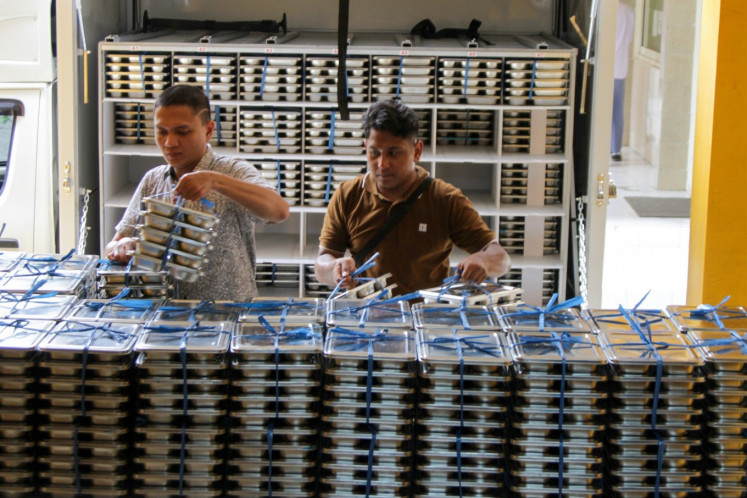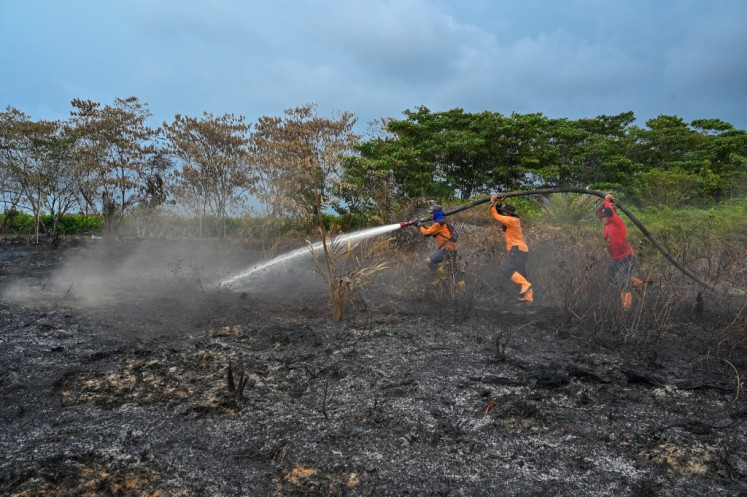Foreign language: How the Russian language opens up opportunities
Going the extra mile: Genevieve Maria Rosalin poses for a picture at the World Russian Language Festival in St
Change text size
Gift Premium Articles
to Anyone

G
oing the extra mile: Genevieve Maria Rosalin poses for a picture at the World Russian Language Festival in St. Petersburg in 2011, where she made into the finals. (Courtesy of Genevieve Maria Rosalin)
Russian language, literature and regional studies open Indonesian students’ minds
Genevieve Maria Rosalin always had a keen interest in languages. Learning English at school, however, did not satisfy her appetite for it. So, at 17, she took a Russian language course at the Russian consulate in her hometown, Surabaya, East Java.
Even though the teaching was minimal – only a book and some guidance on how to pronounce the words -- she still had a keen interest in studying Russian.
Later on, Maria worked in a hotel. Finding that her language skills did not improve much in the hospitality industry, she decided to make a move and in 2000 came to Jakarta.
She attended classes at the Russian Center for Science and Culture in Central Jakarta to improve her language skills.
Then, her teacher told her about a writing competition called the Russian Language Year 2007 in Russia. Having nothing to lose, she took part in the competition and wrote an essay about tourism in Bali. Without anyone expecting it, she won.
“I was surprised myself,” Maria said.
She then flew to Moscow, the capital city of Russia, to accept her certificate with 19 other winners from all around the world.
Maria also took part in the World Russian Language Festival in St. Petersburg in 2011 and 2014, where she reached the finals.
She believes that her own country is not doing enough to recognize these achievements. However, this has not stopped her from pursuing her dream to master Russian.
Maria, who is currently working as a jewelry designer, said that she was still up for another challenge. “There hasn’t been any Russian language competition lately,” she said. “If there is one, I’ll definitely pariticipate."
Besides Russian and her native Indonesian, Maria – who has traveled to many countries – also speaks French, Italian and Spanish.
With her foreign language skills, Maria can translate, interpret and has even taught Indonesian to executives of foreign companies in Jakarta. Even ambassadors have learned Indonesian from her and she once taught a Russian how to speak Italian.

“Everyone was surprised when they found out that an Indonesian taught Italian to a Russian,” she said.
Unlike Maria, who was motivated to study Russian due to her love of languages, 20-year-old Syafira, who is also studying Russian at the center, explained that she found the language, whose alphabet differs from the Latin alphabet, both challenging and interesting. While waiting to start her university studies in international relations next year, she is learning Russian in the meanwhile.
“My friend told me about this course but I was still busy with my high school studies so I couldn’t take part in it,” Syafira said.
She added that learning Russian had a lot of benefits, including adding to her knowledge of the country, expanding her linguistic skills and hopefully getting a scholarship to study in Russia.
Scholarships are among the most common reasons why young people study Russian.
“I’m aiming for a scholarship,” said Grace Jani, 19, who is also a student at the center. She added that one of her relatives had taken the course and had gone to Russia.
Recently, more Indonesians are enrolling in the University of Indonesia’s School of Humanities’ Russian studies department to study Russia’s historical and sociopolitical aspects, and how this has affected the literary works of its writers.
Established in 1958, along with an Arabic literature department, the Russian studies department now accepts around 40 to 50 new students annually.
The department teaches students to understand how Russian society works as a whole. They also study the works of its greatest writers such as Maxim Gorky, Anna Akhmatova, Vladimir Mayakovsky, and more.
Over the last six decades, the department had its ups and downs, corresponding with the ever-shifting nature of global politics as well as fast growing Russia-Indonesia bilateral ties, according to School of Humanities lecturer and researcher Zeffry Alkatiri.
Zeffry is also a poet whose 2012 collection Post Kolonial dan Wisata Sejarah Dalam Sajak (Postcolonialism and Historical Tour through Poetry) won the prestigious Kusala Sastra Khatulistiwa award (then known as the Khatulistiwa Literary Award before its name was changed in 2014).
“At that time, the university also decided to open an Arabic studies department to complement its new Russian studies department, to balance the global tension between Muslims and non-Muslims as well as communists and non-communists, which became even more pronounced after 1965,” he told The Jakarta Post recently.

Zeffry, who is an alumnus of the Russian department, said during the Sukarno era, Indonesia enjoyed a warm relationship with Russia, with Indonesia’s first president paying a couple of visits to the country. Former Soviet Union leader Nikita Khrushchev also paid a visit to Indonesia in 1960 during the Sukarno era.
The Soviet Union helped Indonesia with various infrastructure and industrial projects at the time, including Cilacap Port in Central Java, the Gelora Bung Karno sports complex in Senayan, Central Jakarta, and state-owned steel producer Krakatau Steel’s factory in Banten.
This was why the university thought it was important to set up a Russian studies department in the 1950s, not to mention Russia’s status as a big and influential nation, Zeffrey said.
Studying canonical literary works by Russian authors such as Nikolai Gogol, Leo Tolstoy and Fyodor Dostoyevsky, among others, had become an integral part of the department, according to Zeffrey. “By studying a society’s literature, we can also see a representation of a society that is developing itself, particularly in terms of how they attain socioeconomic welfare.”
After a failed attempt to overthrow Sukarno in 1965, an incident blamed on the Indonesian Communist Party that served as a pretext to a communist pogrom in Indonesia, the New Order regime, which assumed power afterward under Soeharto, imposed strong restrictions on intellectual endeavors related to communism and Marxism. Soeharto also suspended all types of cooperation with the Soviet Union after the coup attempt.
Zeffrey said, as a consequence of the authoritarian regime’s thought-policing, the department was left with a paucity of academic material, adding that during the New Order regime only a small number of students, around 15 to 18 per batch, enrolled. Between 1978 and 1981, he continued, the university had to temporarily close the department because of a lack of students.
Zeffrey said students started to show an interest in the department again in 1981 and in 2004 it recorded an increase of around 20 students per batch after then-president Megawati Soekarnoputri restored bilateral ties with Russia in 2003.
He added that Indonesian students’ interest in Russian studies was piqued again after the New Order regime was toppled, with around 20 students enrolling in 2004. The figure has doubled recently.
Zeffrey said over the years, the department had evolved from focusing mainly on Russian literary works to one that also dissected Russian civilization as a whole. “Many Indonesians are interested to know more about Russia, the process it has been through to evolve into a great nation and its involvement in the Cold War.”
According to him, the department’s alumni currently worked in various public and private sectors, such as the Foreign Ministry, as well as working as interpreters, translators and consultants for various Russian investors and businesspeople.
One of the top alumni is Gerindra Party leader and Deputy Speaker of the House of Representatives Fadli Zon who graduated from the department in 1997 with top honors.
Many, like Zeffrey, have also gone on to work in the Indonesian literary scene, such as internationally acclaimed novelist Ayu Utami and publishing house PT Gramedia Pustaka Utama editor Mirna Yulistianti who handles senior authors such as poet Sapardi Djoko Damono and Indonesian novelist Eka Kurniawan.









